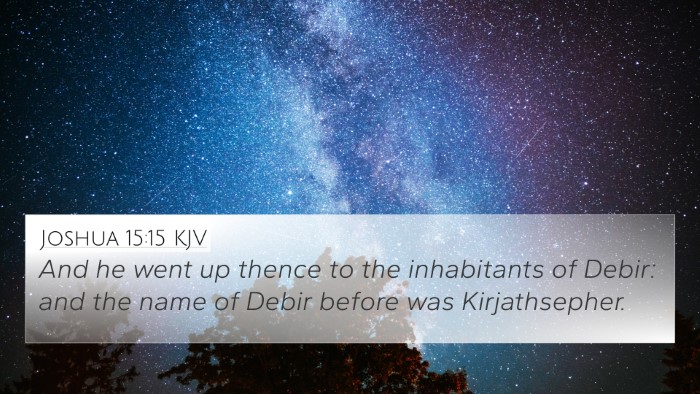Understanding Joshua 10:38
Verse Text: "And Joshua returned, and all Israel with him, to Debir; and fought against it."
Summary of Joshua 10:38
This verse describes the continuation of Joshua's conquests as he leads the Israelites in battle against Debir. After achieving victory over other cities, Joshua resumes his campaign, highlighting his determination and leadership. Matthew Henry emphasizes the significance of Joshua's actions as a demonstration of God's promises fulfilled through his faithful servant.
Meaning and Insights
- Leadership and Responsibility: Joshua embodies the qualities of a strong leader willing to engage in battle for the sake of the Lord's command. His return to Debir signifies not only personal responsibility but also communal commitment as he leads the people of Israel into warfare.
- Fulfillment of Divine Promises: Albert Barnes notes that Joshua’s endeavors were directly tied to God's promises to the Israelites regarding their inheritance of the land. Each battle fought and won serves as a reminder of God's faithfulness.
- Strategic Warfare: Adam Clarke points out that this was not merely a random attack but part of a strategic military campaign, showcasing planning in Joshua's approach to fully take possession of the Promised Land.
- Faith and Obedience: This verse illustrates the connection between faith in God's promises and active obedience through battle. Joshua's actions reflect the theme of trust in God’s guidance.
- Importance of Community Action: The phrase “all Israel with him” underscores the idea of collective effort, as the community stands together in obedience to God’s directives, reinforcing unity among the Israelites.
Cross-References to Joshua 10:38
- Joshua 10:28-39: The verses surrounding Joshua's victories accentuate the importance of the battles he fought in God’s name.
- Joshua 11:16-23: This theme of conquest continues, underscoring the totality of the Israelite victories.
- Deuteronomy 7:1-2: These verses provide context regarding God’s command to drive out nations, setting a precedent for Joshua’s actions.
- Psalm 44:3: This Psalm reflects on how victories were not achieved by human effort, but through divine assistance, paralleling the reliance Joshua placed on God.
- Hebrews 11:30-31: The heroes of faith, including Joshua, are noted for their victories, linking the New Testament's emphasis on faith to Old Testament actions.
- 1 Samuel 15:18: God’s instructions regarding battles and obedience echo the lessons learned through Joshua’s leadership.
- Romans 8:31: This New Testament assurance that "If God is for us, who can be against us?" resonates with Joshua's trust in God during battles.
Thematic Connections Between Bible Verses
The narrative of Joshua's leadership and the campaigns against various cities consistently reflects the deeper themes found throughout the Bible:
- Faith and Works: The relationship between believing in God’s promises and taking action is a recurring motif.
- The Importance of Obedience: Joshua's victories highlight the need for obedience to God, echoing throughout the scripture.
- Divine Justice: The conquest of lands aligns with themes of divine justice where God acts against those who oppose His will.
Tools for Further Understanding
To delve deeper into cross-referencing and understanding connections between Bible verses, consider utilizing:
- Bible Concordance: A useful tool for locating various scripture references and themes.
- Bible Cross-Reference Guide: Helps in linking scripture and understanding contexts better.
- Cross-Reference Bible Study: Engaging with scripture through cross-referencing can deepen comprehension.
Conclusion
Joshua 10:38 serves as a critical junction in the narrative, reinforcing themes of leadership, obedience, and divine promise. Studying this verse alongside its cross-references, one gains a greater understanding of its significance and the broader themes present in scripture. Engaging in comparative Bible verse analysis and linking Bible scriptures enriches our biblical understanding and strengthens our faith journey.







